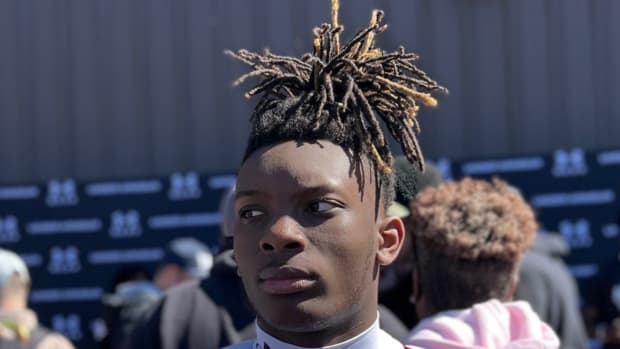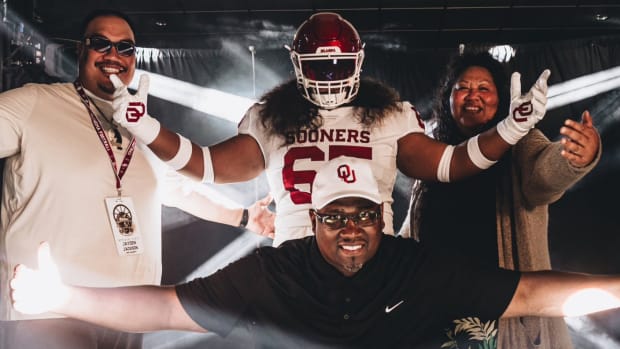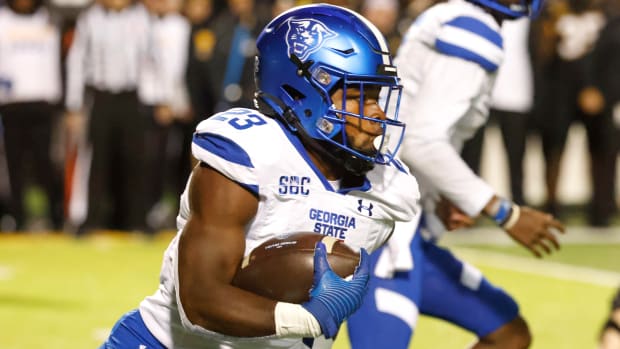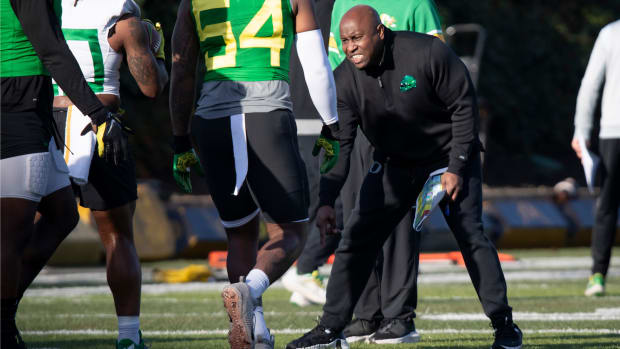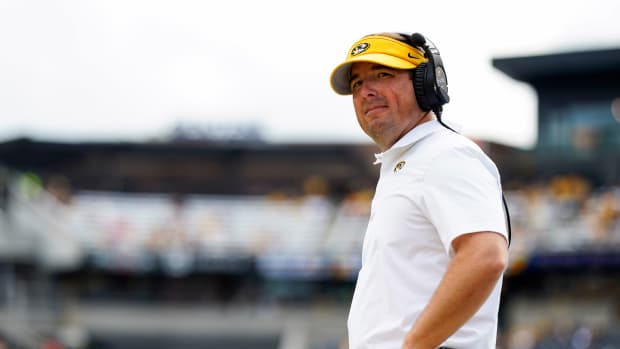Jalen Hurts's Transfer to Oklahoma Was a No-Brainer for All Involved
UPDATE: Oklahoma has reportedly granted quarterback Austin Kendall the right to transfer to West Virginia as a graduate student and be immediately eligible to play during the 2019 season.
You have reached your limit of 4 premium articles
Register your email to get 1 more
This had to be the easiest transfer decision in the history of transfer decisions.
Former Alabama quarterback Jalen Hurts is the most accomplished graduate transfer quarterback since graduates were allowed to transfer without sitting out a year. (Yes, this includes when Russell Wilson left NC State for Wisconsin.) Oklahoma coach Lincoln Riley has coached two consecutive transfer quarterbacks to the Heisman Trophy. I imagine the conversation went a little like this…
Riley: So?
Hurts: Uh, yeah.
O.K., they probably said a little more than that. But the end result was the same. Hurts is headed to Norman, where Baker Mayfield and Kyler Murray just won the Heisman and where NFL coaches have beaten a well-worn path in the past 18 months to pick Riley’s brain with the hope of borrowing something they could install in their own offenses at that level. Hurts broke that news Wednesday in the middle of a heartfelt thank you at The Players Tribune to everyone at Alabama for three years that featured a national title, two SEC titles and three trips to the national title game.
Jalen’s father Averion predicted to Bleacher Report this summer that Jalen would be the biggest free agent in college football history. But that free agency didn’t even come down to a real choice. Yes, it would have been convenient for Hurts to play at Maryland for former Alabama offensive coordinator Mike Locksley or at Miami, where former Alabama quarterbacks coach Dan Enos is now running the offense. The learning curve wouldn’t have been as steep. But how could a competitor turn down a shot to play for the program that has produced the last two Heisman winners, won four consecutive Big 12 titles and made the College Football Playoff each of the past two years?
There also is the matter of Hurts’s NFL future. He would like to prove he can be a starting quarterback in the NFL. The knock on Hurts in his two seasons as Alabama’s starter was that he wasn’t a polished enough passer to be effective at the next level. And the final three games of his two-season tenure as Alabama’s starter—a loss at Auburn, a Sugar Bowl win against Clemson and a 13–0 halftime deficit in the national title game against Georgia—certainly poured fuel on that narrative. Against the best collections of athletes he faced in the 2017 season, Hurts completed 31 of 64 passes for 353 yards and three touchdowns. That’s an average of 5.5 yards an attempt, and that’s not good.
But not all quarterbacks arrive fully formed. Hurts threw much better against below average and O.K. teams, and his running ability proved excellent no matter the opponent. Still, he lost his job to Tua Tagovailoa after Tagovailoa led Alabama to a win in the second half and overtime of that national title game against Georgia. And even though we all assumed Hurts would transfer, sit out a year and then spend two seasons as a starter somewhere else, Hurts decided to write his own story. He stayed at Alabama for the 2018 season and competed with Tagovailoa for the starting job. He did not win it because Tagovailoa is better, but not being better than Tua Tagovailoa certainly doesn’t exclude anyone from being a successful starter in college (and probably not the NFL). Hurts didn’t take advantage of the new redshirt rule to preserve a season of eligibility, instead staying as Tagovailoa’s backup and waiting for the moment Alabama needed him.
That moment came with Alabama trailing by seven late in the SEC title game against Georgia, and when Hurts was needed, he looked like a completely different thrower. The guy who completed 7 of 9 passes for 82 yards and a touchdown looked like someone who would thrive in any offense.
Now Hurts will work with Riley, who built an offense around Mayfield and helped him become the No. 1 pick in the 2018 draft. Riley then reworked the offense around Murray, who had an even better 2018 than Mayfield’s amazing 2017. Riley won’t try to stuff Hurts into a box and say “Bend to my genius.” Riley will craft the offense around Hurts.
And who knows? Maybe Hurts will wind up sitting in New York alongside Tagovailoa at the Heisman ceremony. And if we really want some graduate transfer symmetry, Clemson’s Trevor Lawrence and Missouri’s Kelly Bryant—the player Lawrence replaced as Clemson’s starter—will be there with them. This would be a happy byproduct of Hurts’s transfer choice, but given what we’ve seen from the Oklahoma quarterback position, it doesn’t seem at all implausible.
LITMAN: Tate Martell Sees Both Sides of the Transfer Portal En Route to Miami
Now that Hurts has made a supremely logical decision, it’s time for Oklahoma to make another one. ESPN is reporting that the Sooners are trying to enforce a Big 12 rule that would keep Austin Kendall, Murray’s backup who chose to transfer when it became clear his coaches were recruiting Hurts over him, from playing the 2019 season at West Virginia if he decides to transfer there. Kendall has graduated from Oklahoma, so he’s free under NCAA rules to play immediately at another school. But the Big 12 has a rule that requires all intra-conference transfers to sit for a year.
This rule isn’t hard and fast, though. Former Kansas State quarterback Alex Delton has graduated and expects to play immediately at TCU. Both those schools are in the Big 12. Last season, safety John Bonney graduated from Texas and played immediately for Texas Tech. Those two schools also are in the Big 12.
Other leagues already have addressed this issue to get on the same page as the NCAA’s rule. Two years ago, Alabama coach Nick Saban tried to make the SEC enforce a league rule that would have kept defensive back Maurice Smith from transferring to Georgia and playing immediately. When it became clear the SEC office wasn’t going to back Saban, he let it drop and Smith transferred and played for the Bulldogs. SEC presidents then voted to scrap the rule at the league’s annual meetings last June. The Big Ten and Pac-12 now regard graduate transfers within the league similarly.
Oklahoma is only going to get bashed as petty if Kendall isn’t allowed to play right away. Why would the Sooners, who clearly didn’t think Kendall was good enough to start for them, be scared of him playing against them?
Oklahoma has its quarterback, and he’s a great one. So there’s no harm in letting someone else in the league play with one of Oklahoma’s castoffs.
